WWE Hall Of Famer And Olympic Gold Medalist Kurt Angle Opens Up About His Drug Dependency To Help Others Overcome Their Own Addictions

A&E’s Biography is devoting a summer of specials to the trials and tribulations of some of the WWE’s most noteworthy “sports entertainers.” Last Sunday, the documentary series devoted two hours to former multi-time champion and Olympic gold medal winner Kurt Angle.
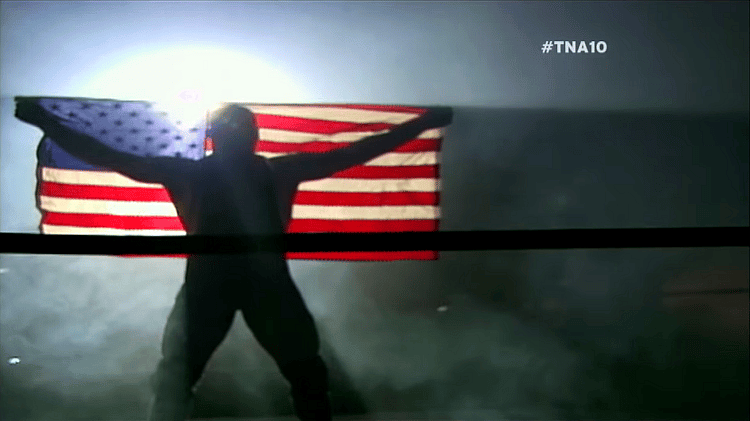
While they glossed over his time in TNA Wrestling, which was a decade longer than his WWE career, they did so for a good reason. Angle wanted to come clean about his demons of addiction to pills and alcohol that plagued him while he was there and since he left WWE in 2006.
“I went through a lot of turmoil in my life and I want to help others,” Angle told Fox News. “Having a problem with addiction and being in recovery for the last nine years, I was told in the recovery center to tell your story, and I’ve been pretty open about my story.”
He added, “And I wanted this documentary to come out to help anybody. Anybody that’s in trouble. Anybody that’s dealing with addiction. Anybody that’s trying to overcome obstacles…It’s more about redemption and overcoming.”
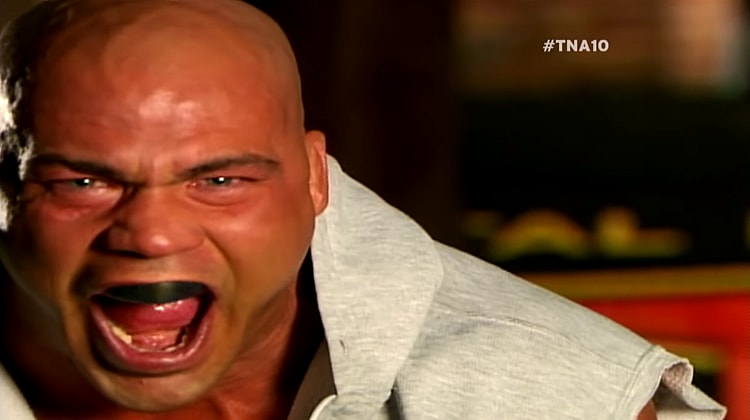
Angle overcame a great deal of tragedy to get to the Olympics in 1996 from the murder of his coach Dave Schultz to breaking his neck for the first time — all on the road to his first big accolade.
“I would hope it was a proud moment for everybody,” he said, admitting, “It was the proudest moment of my life besides having kids and getting married. You know, you’re never guaranteed any kind of success in life, and when you win an Olympic gold medal, you’re the best in the whole entire world. And that sends a message to everybody that you’re very special, that you stand out.”
His pivotal win for himself and the USA over Iran’s Abbas Jadidi also came in the aftermath of the Olympic Park bombing that turned into a media sensation later documented in the Clint Eastwood’s biographical drama Richard Jewell. But luckily, the US attained wins at the games the country could be proud of despite the tragedy.
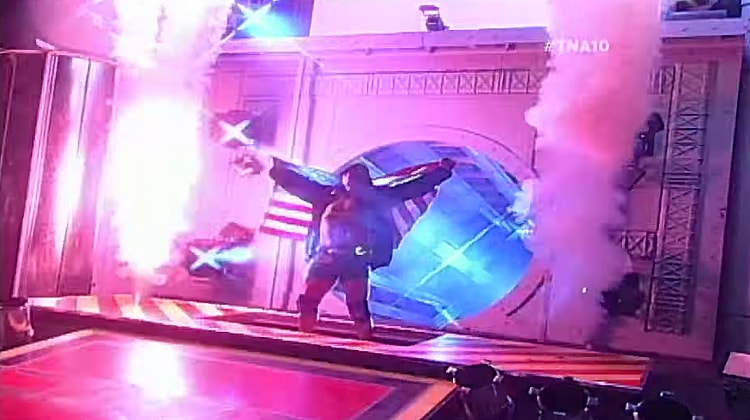
“I think in that particular time, the bombing happened and people needed something to cheer about,” Angle continued. “And you know Kerri Strug did the dismount and landed it perfectly and won for Team USA Gymnastics. That was a great moment, my moment was great. There were a lot of great moments in the Olympics in 1996 that the USA had to be very proud of.”
Coming off his win and the celebration, he was quickly scouted and given an offer by WWE at the time but turned it down; one he turned down at the time — not wanting to lose on TV — ever — and not taking pro wrestling that seriously at that point.
He would appear on a show run by Extreme Championship Wrestling that would go south very quickly and potentially jeopardize any notion WWE had of bringing him in. On the night in question, ECW star The Sandman was mock crucified complete with a crown of thorny barbed wire, causing Angle to storm out of the building in disgust.

ECW was out of the question but, still willing to give it a try, Angle consulted controversial figure Ric Flair on what he should do with two options left back then: WWE and its main competitor World Championship Wrestling.
“I met Ric Flair before I signed with WWE and I said, ‘Hey, Ric, do you think I should go to WWE or WCW?’” Angle explained. “Ric was in WCW at the time. He said, ‘Do not come to WCW. They’ll annihilate you. They will crush you. Go to WWE because Vince McMahon would take care of you.’ And he was absolutely right. That’s what Vince McMahon did, he took care of me.”
McMahon would hype Angle’s debut with a series of vignettes playing up Angle’s accomplishments in a snarky way that would drive fans to turn on him. Irking them further was his status as a “Real Athlete” and his Three I’s motto: Intensity, Integrity, and Intelligence.

Angle revealed, “He thought it was perfect for me to be an Olympic gold medalist. He wanted me to be this clean-cut Olympian that preached the three I’s and motivated fans. And actually, he knew it would backfire.”
“He was pretending to push me as a baby face knowing that the fans would crap all over me because I was so clean cut, it was like, give me a break, this guy can’t be that good,” he added. “It worked extremely well and it turned me heel. Even though I would preach the three I’s, I would still cheat and win. That also gave me a lot of heat.”
The ex-WWE Chairman, beleaguered by misconduct allegations and reports of hush money that forced him into retirement, was praised and defended by Angle repeatedly.
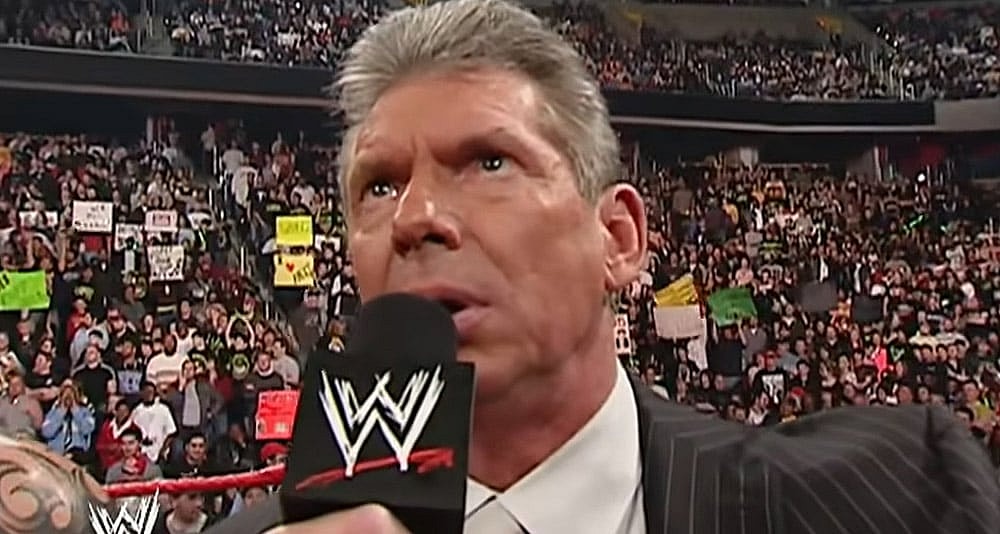
RELATED: Wrestler And Former WWE Superstar Rene DuPree Compares Amber Heard To Spoiled Dog
“I’m sad because Vince was the Achilles heel of WWE. He’s what made it roll, he’s what made it happen. If it weren’t for Vince, the WWE would not exist,” Angle said of McMahon’s exit. “I’m not saying he’s perfect. He didn’t do everything perfectly. He made very few mistakes from a business standpoint.”
That said, the frequent neck injuries that sent Angle down the road of drug dependency were suffered while working for McMahon. After four years, he was popping 65 Vicodin tablets a day and his condition was compounded by the overdose death of his sister.
Hoping he’d seek treatment, WWE let him go in 2006. Instead of taking time off, the Olympian jumped to TNA where he spent a decade with a lighter schedule.
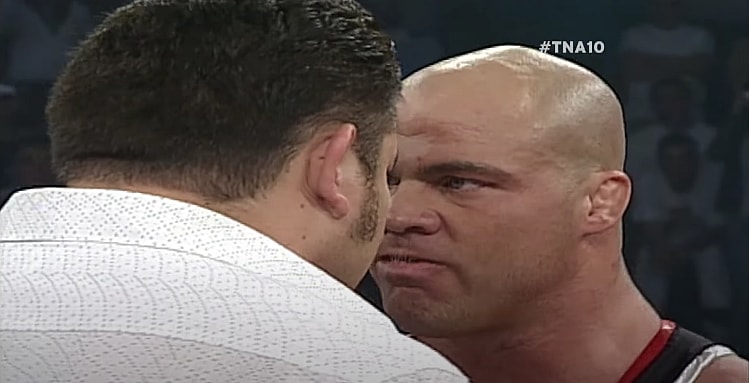
Unfortunately, it didn’t help and Angle’s health did not improve. He was arrested often for drug possession, intoxication, DWI, and even stalking between 2007 and 2013. Soon after, he finally sought treatment and got better for his family.
“It came down to this: my wife was going to leave me if I didn’t go to rehab. And she’s everything to me and so are my kids,” he shared. “And knowing I could [lose] them, it was more important to me to get rid of my addiction and stay clean and be with my wife and kids than it was for me to continue to be addicted.”
Angle added, “I want them to know that this documentary is about overcoming everything — all obstacles, addiction, injuries, death of family members, personal things in your lives. It’s about redemption and gaining back your reputation after you lost it.”

He continued, “And I want everybody to know that it’s possible. Even at the worst point in your life, you could still come out of it and come out shining.”
Kurt Angle retired in 2017 and may have beaten addiction, but a return to the ring for one more match is very remote after he recently had both his knees replaced.
NEXT: Former WWE Superstar Val Venis Kicked Off Twitter With No Explanation
